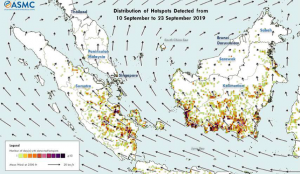Update on Current Fire Season in Indonesia
The current fire situation in Indonesia and resulting haze is a serious national and international problem that must be tackled through a collaborative, multi stakeholder approach that seeks to comprehensively address the root cause of burning and the current spate of fires.
Over the past weeks, we have been proactively communicating with stakeholders and the media on our fire situation. A number of NGOs and media have recently released reports and published stories on the current situation, some of which mention APRIL. Here we provide an update to all of our stakeholders regarding APRIL’s actions, now and in the past, to prevent and suppress fires.
Current Situation

Source: ASMC http://asmc.asean.org/home/
The current smoke haze affecting Sumatra, and which has spread as far as Singapore and Kuala Lumpur, is caused in most part by fires in Jambi, South Sumatra and in Borneo and Kalimantan, with some fires also occurring in Riau. Prevailing winds from Jambi and South Sumatra can carry the smoke haze northwards across Riau where our operations are located and onwards to the Malay Peninsula. The smoke haze affecting Singapore generally also originates from South Sumatra and Jambi but can also come from fires in Kalimantan and Borneo.
Overall, there has been no significant impact on our operations. APRIL’s concession areas remain comparatively free of fire, including our restoration and conservation areas.
Global Forest Watch Data for the period 1 September to 24 September indicates that 88% of all hotspots in Riau occurred outside wood fibre concessions, with APRIL and its suppliers accounting for 2%. At the end of August this year, APRIL had identified 384 hotspots, with 8% confirmed as fires. Breaking this down further, 102 of these hotspots were associated with 15 unique fire incidents. These were mostly small fires of less than one hectare and were rapidly detected, suppressed, reported and investigated. This overall ratio of hotspots to fires confirms to the historical pattern for our operational area. In September, we recorded 18 hotspots across APRIL and its suppliers’ concession areas, 14 of which were related to the same fire incident.
APRIL gathers hotspot and fire data from two NASA-based systems – NOAA and MODIS satellites that indicate a thermal anomaly within a 1.1km2 area – as well as Aqua, Terra and SNPP (Ministry of Environment and Forestry) data, supported by our own inputs from fire monitoring towers and CCTV. Not all data sources are consistent, so every hotspot is ground-truthed and reported within 24 hours to manage this variance.We remain vigilant with our fire response and suppression in and outside our concessions too, supporting the suppression of 14 fire incidents up to 5km outside our concessions areas.
APRIL is fully compliant with relevant Indonesian Government’s regulations. Following two reported fire incidents – one in an APRIL (PT RAPP) concession and the other in a concession belonging to a supply partner – the specific fire sites within these concessions sites have been enclosed by the Ministry of Environment and Forestry so that their cause can be further investigated.
The PT RAPP fire incident occurred in Pelalawan North – Block Dayun in an area that overlaps with an area managed by PT Caltex Pacific Indonesia that has been the subject of an ongoing land dispute between local communities and is mostly planted with community oil palm. The supplier concession that suffered fire damage is PT SRL Block 3 (Kubu), which has a long history of unresolved land claims and encroachment dating back to when the HTI (industrial plantation forest) permit was obtained. As a result, the company has not been able to carry out any operational activities, including plantation development and the area has been frequently encroached for oil palm plantation establishment. This most recent fire supported the continuation of oil palm plantation expansion on the concession. We are cooperating fully with the investigations in both cases.
Overall Approach to Fire Prevention and Suppression
We have worked diligently for the past several years on fire prevention, engaging with local communities to help and incentivise them to change practices through our Fire Free Village Program and other actions. The facts demonstrate that this initiative has born clear results in the participating villages, with a reduction in the incidence of fires and in the amount of land burnt.
We have invested USD9 million in our fire suppression capability and are currently fully deploying two helicopters, two airboats, 39 lookout towers, 482 water pumps, and firefighting training for 724 volunteers across 39 Riau villages. We are aided by our new Fire Coordination Centre – located near the company’s production operations – in managing fire monitoring and suppression activities across all APRIL and supplier concessions
We remain committed to responsible, science-based peatland management and we protect and manage the single, biggest peatland restoration project in Riau Province, Indonesia through the Riau Ecosystem Restoration (RER) project. Totalling 150,000 hectares, RER has had zero fire despite other ecosystem restoration areas struggling to prevent encroachment and burning in this particularly dry season.
The current fire situation is a crisis that needs all stakeholders to work together in a constructive and collaborative manner. APRIL is committed to being part of this action and will continue to seek lasting solutions in support of the Indonesian government, the local communities and other stakeholders.
- The ASEAN Specialised Meterological Centre provides a regular update on haze patterns in the region. See http://asmc.asean.org/asmc-fire/




